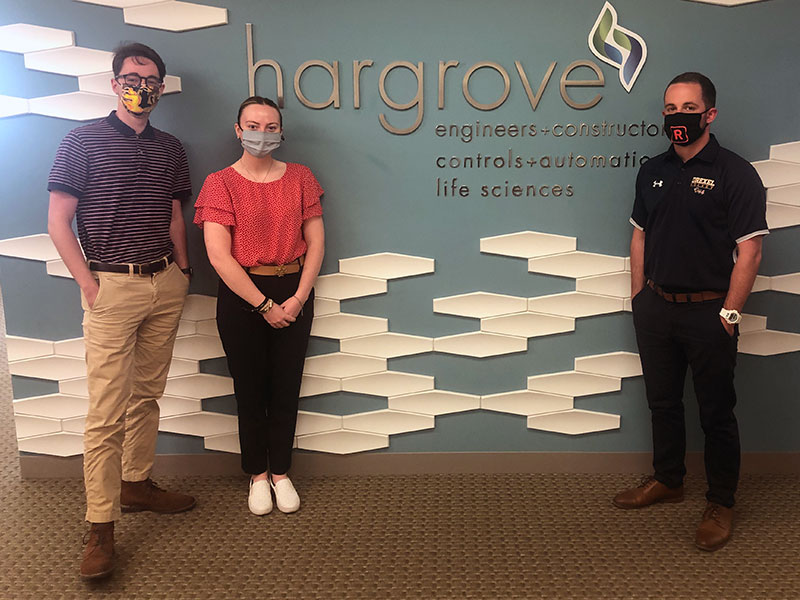When senior electrical engineering major Bryan O’Toole, fourth year mechanical engineering major Meghan Wickersham and fourth year civil and architectural engineering major Daniel Inglis were searching for co-op opportunities, they each wanted different things. Bryan, a transfer student, wanted to get his foot in the door at a major company and quickly learn the kind of work he’d be doing. Meghan hoped to fine-tune her skills in the popular AutoCAD software. Daniel had tried his hand at a structural engineering co-op and learned that he preferred the mechanical side of things.

Daniel Inglis, Meghan Wickersham and Bryan O’Toole
They all found what they were looking for in Hargrove Life Sciences, an engineering consulting firm in Center City, Philadelphia. The firm helps clients plan major projects including building design, manufacturing and quality assurance. The breadth of projects gives the three co-ops multiple opportunities to experience different kinds of work.
“My title is process mechanical engineer co-op, and I work with AutoCAD support for red-line drafts or updating designs,” Wickersham says. “What’s great is that, because I’m assisting in the design process of these structural systems, I get to actually go out in the field, and examine the floor piping, the ceiling piping, and then I’ll go into the office and translate that into AutoCAD. It’s great hands-on experience.”
Inglis, who is a co-op on Hargrove’s building mechanical team, says that working with offices across the country is helping him become a better communicator.
“Hargrove is a big company, and they have a lot of offices, especially in the South,” he says. I'm at a point where I just talked directly to a contact from the headquarters office down in Alabama on this project that they're working on, and there’s a lot of coordination of the systems to make sure that nothing we’re using for these designs clashes with each other.”
“Co-op shows you a different level of professionalism than the classroom.”
Meghan Wickersham
O’Toole, who transferred to Drexel and is taking part in a co-op for the first time, says that where the co-op experience stands out is in the level of engagement he can have with his colleagues.
“The people that work there are very genuine and caring people who understand that we're going to have questions, and they really do take the time to get make sure that we understand not just the steps of what we’re doing but also the purpose, to make sure that it makes sense to us,” he says. “I think this is a huge advantage for the three of us working at Hargrove because after we graduate college not only will we be able to explain the different types of work we've done within the company, but we also are going to be able to show future employers that we were able to grasp a much deeper knowledge of the many projects we've worked on. I felt like that wasn't always the case at my previous internships.”
The experience at Hargrove, the students say, will also help them both as they move back into the classroom and as they shape their careers.
“Co-op shows you a different level of professionalism than the classroom,” Wickersham says. “Textbooks show very specific use cases of AutoCAD, for example, but to be able to see how people use it in a day-to-day situation, I think I’ve learned some different approaches and tricks that I can bring back with me.”
“In my wildest dreams I would be some sort of artist, but I think the way that I'm leaning I find designing tiny homes really interesting,” Inglis says. “I want to kind of become really well-rounded as an architectural engineer, which is why I wanted to do structural engineering for my second co-op, and why I’m trying to pick up as much experience I can now that I’m at Hargrove, from mechanical work to plumbing planning and so on. It will all help me toward that ultimate goal.”